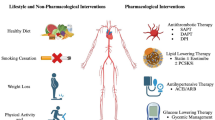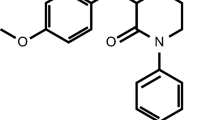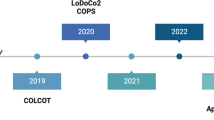Abstract
Eptifibatide, a molecule isolated from the venom of the southeastern pygmy rattlesnake, selectively inhibits the platelet receptor IIb/IIIa. The safety and clinical efficacy of eptifibatide in patients undergoing percutaneous coronary intervention (PCI) was first evaluated in the Integrilin to Minimize Platelet Aggregation and Coronary Thrombosis (IMPACT) trial. In this study, the primary combined endpoint (composite of death, myocardial infarction [MI] or target vessel revascularization [TVR] at 30 days) occurred in 9.6% of the patients assigned to eptifibatide bolus followed by the 4-hour infusion versus 12.2% in the placebo group (p = 0.67). In the IMPACT-II trial, two different eptifibatide dosages were studied in 4011 patients undergoing elective PCI. The primary endpoint (death, MI, TVR or stent placement for threatened vessel closure at 30 days) occurred in 11.6% in the placebo group versus 9.1% in the 135/0.5 eptifibatide group (p = 0.035) and 10% in the 135/0.75 eptifibatide group (p = 0.18). The Enhanced Suppression of Platelet IIb/IIIa Receptor with Integrilin Therapy (ESPRIT) trial studied a dose of eptifibatide 3- to 4-fold higher than that used in IMPACT II trial in patients undergoing non-emergent coronary artery stenting (two 180 μg/kg bolus doses 10 minutes apart). The 6-month composite endpoint (death, MI, TVR and ‘bailout’ eptifibatide use) occurred in 18.3% of patients in the placebo group versus 14.2% in the eptifibatide group (p = 0.008) and was maintained at 12 months (22.1% in the placebo group vs 17.5% in the eptifibatide group, p = 0.0068). The Platelet Glycoprotein IIb/IIIa in Unstable Angina: Receptor Suppression Using Integrilin Therapy (PURSUIT) study in 10 948 patients was designed to study the effect of eptifibatide in the treatment of acute coronary syndromes (ACS) using two different dosages (180 μg/kg bolus followed by an infusion of either 1.3 μg/kg/min or 2 μg/kg/min. The primary endpoint, a composite of death or MI at 30 days, occurred in 15.7% of placebo-treated patients and 14.2% of eptifibatide-treated patients (p = 0.042). This difference was maintained at 7 days (11.6% in the placebo group vs 10.1% in the eptifibatide group, p = 0.016) and at 30 days (15.7% in the placebo group vs 14.2% in the eptifibatide group). In the eptifibatide studies, the rates of major bleeding were 0.7% (0.5% in the control group) in ESPRIT and 2.1% (1.3% in the placebo group) in PURSUIT. The incidence of intracranial bleeding was 0.2% in ESPRIT (0.1% in the placebo group) and 0.7% in PURSUIT (0.8% in the placebo group). Significant thrombocytopenia (platelet count <20 000/μL) was reported in 0.2% of the patients receiving eptifibatide in the ESPRIT trial (0% in the placebo group) and in <1% in PURSUIT (<1% in the placebo group). In summary, several clinical trials have demonstrated a clear-cut reduction in a variety of ischemic events in patients receiving eptifibatide as adjunctive pharmacotherapy during PCI.













Similar content being viewed by others
References
Fuster V, Badimon L, Badimon JJ, et al. The pathogenesis of coronary artery disease and acute coronary syndromes. N Engl J Med 1992; 326: 242–50
Fuster V, Fallon JT, Nemerson Y. Coronary thrombosis. Lancet 1996; 348 Suppl. 1: s7–s10
Lefkovits J, Plow EF, Topol EJ. Platelet glycoprotein IIb/IIIa receptors in cardiovascular medicine. N Engl J Med 1995; 332: 1553–9
Plow EF, Marguerie G, Ginsberg M. Fibrinogen, fibrinogen receptors and the peptides that inhibit these interactions. Biochem Pharmacol 1987; 36: 4035–40
Andrieux A, Hudry-Clergeon G, Ryckewaert J-J, et al. Amino acid sequences in fibrinogen mediating its interaction with its platelet receptor, GP IIb/IIIa. J Biol Chem 1989; 264: 9258–65
Coller BS, Peerschke EI, Scudder LE, et al. A murine monoclonal antibody that completely blocks the binding of fibrinogen to platelets produces a thromboasthenic-like state in normal platelets and binds to glycoproteins IIb and/or IIIa. J Clin Invest 1983; 72: 325–38
Kong DF, Califf RM, Miller DP, et al. Clinical outcomes of therapeutic agents that block the platelet glycoprotein IIb/IIIa integrin in ischemic heart disease. Circulation 1998; 98: 2829–35
Madan M, Berkowitz SD, Tcheng JE. Glycoprotein IIb/IIIa integrin blockade. Circulation 1998; 98: 2629–35
Lincoff AM, Califf RM, Topol EJ. Platelet glycoprotein IIb/IIIa receptor blockade in coronary artery disease. J Am Coll Cardiol 2000; 35: 1103–15
Scarborough RM, Naughton MA, Teng W, et al. Design of potent and specific integrin antagonists: peptide antagonists with high specificity for glycoprotein IIb–IIIa. J Biol Chem 1993; 268: 1066–73
Scarborough RM, Hsu MA, Teng W, et al. C68-22, a novel glycoprotein (GP) IIb–IIIa specific platelet aggregation inhibitor designed from the structure of barbourin (abstract). Arterioscler Thromb 1991; 11: 1591a
Plow EF, Ginsberg MH. Cellular adhesion: GP IIb/IIIa as a prototype adhesion receptor. Prog Hemost Thromb 1989; 9: 117–56
Jennings LK, Jacoski MV, White MM. The pharmacodynamics of parenteral glycoprotein IIb/IIIa inhibitors. J Interv Cardiol 2002; 15(1): 45–60
Alton KB, Kosoglou T, Baker S, et al. Disposition of 14C-eptifibatide after intravenous administration to healthy men. Clin Ther 1998; 20(2): 307–23
Integrilin® (eptifibatide) prescribing information. South San Francisco (CA): Millenium Pharmaceuticals, Inc., 2002 Aug
Bates ER, McGillem MJ, Mickelson JK, et al. A monoclonal antibody against the platelet glycoprotein IIb/IIIa receptor complex prevents platelet aggregation and thrombosis in a canine model of coronary angioplasty. Circulation 1991; 84: 2463–9
Gold HK, Coller BS, Yasuda T, et al. Rapid and sustained coronary artery recanalization with combined bolus injection of recombinant tissue-type plasminogen activator and monoclonal antiplatelet GP IIb/IIIa antibody in a canine preparation. Circulation 1988; 77: 670–7
Coller BS, Folts JD, Smith SR, et al. Abolition of in vivo platelet thrombus formation in primates with monoclonal antibodies to the platelet GP IIb/IIIa receptor: correlation with bleeding time, platelet aggregation and blockade of GP IIb/IIIa receptors. Circulation 1989; 80: 1766–74
Harrington RA, Kleiman NS, Granger CB, et al. Relation between inhibition of platelet aggregation and clinical outcomes. Am Heart J 1998; 136: S43–50
White MM, Jennings LK. Platelet protocols. San Diego (CA): Academic Press, 1999
Harrington RA, Kleiman NS, Kottke-Marchant K, et al. Immediate and reversible platelet inhibition after intravenous administration of a peptide glycoprotein IIb/IIIa inhibitor during percutaneous coronary intervention. Am J Cardiol 1995; 76: 1222–7
Tardiff BE, Jennings LK, Harrington RA, et al. for PERIGEE Investigators. Pharmacodynamics and pharmacokinetics of eptifibatide in patients with acute coronary syndromes: prospective analysis from PURSUIT. Circulation 2001; 104: 399–405
Tcheng JE, Talley JD, Shea JC, et al. Clinical pharmacology of higher dose eptifibatide in percutaneous coronary intervention (the PRIDE study). Am J Cardiol 2001; 88: 1097–102
Phillips DR, Teng W, Arfsten A, et al. Effect of Ca2+ on GP IIb-IIIa interactions with integrilin: enhanced GP IIb–IIIa binding and inhibition of platelet aggregation by reductions in the concentration of ionized calcium in plasma anticoagulated with citrate. Circulation 1997; 96: 1488–94
Gilchrist I, Conor S, Kosoglou T, et al. Pharmacodynamics and pharmacokinetics of higher dose, double bolus eptifibatide in percutaneous coronary interventions. Circulation 2001; 104: 406–11
IMPACT-II Investigators. Randomized placebo-controlled trial of effect of eptifibatide on complications of percutaneous coronary intervention. IMPACT-II. Lancet 1997; 349: 1422–8
Tcheng JE, Harrington RA, Kottke-Marchant K, et al. Multicenter, randomized, double-blind, placebo-controlled trial of the platelet integrin glycoprotein IIb/IIIa blocker integrilin in elective coronary intervention. IMPACT Investigators. Circulation 1995; 91: 2151–7
Tcheng JE. Impact of eptifibatide on early ischemic events in acute ischemic coronary syndromes: a review of the IMPACT II trial. Am J Cardiol 1997; 80 Suppl. 4A: 21B–8B
ESPRIT Investigators. Novel dosing regimen of eptifibatide in planned coronary stent implantation: a randomized, placebo-controlled trial. Lancet 2000; 356: 2037–44
O’shea JC, Hafley G, Greenberg S, et al. Platelet glycoprotein IIb/IIIa integrin blockade with eptifibatide in coronary stent intervention. JAMA 2001; 285: 2468–73
O’shea JC, Buller CE, Cantor WJ, et al. Long term efficacy of platelet glycoprotein IIb/IIIa integrin blockade with eptifibatide in coronary stent intervention. JAMA 2002; 287: 618–21
Fintel DJ, Ledley GS. Management of patients with non-ST segment elevation acute coronary syndromes: insight from the PURSUIT trial. Clin Cardiol 2000; 23 Suppl. V: V1–V12
PURSUIT Trial Investigators. Inhibition of platelet glycoprotein IIb/IIIa with eptifibatide in patients with acute coronary syndromes. N Engl J Med 1998; 339: 436–43
Chesebro JH, Knatterud G, Roberts R, et al. Thrombolysis in Myocardial Infarction (TIMI) trial, phase I: a comparison between intravenous tissue plasminogen activator and intravenous streptokinase: clinical findings through hospital discharge. Circulation 1987; 76: 142–54
GUSTO Investigators. An international randomized trial comparing four thrombolytic strategies for acute myocardial infarction. N Engl J Med 1993; 329: 673–82
Bhatt DL, Lee BI, Casterella PJ, et al. Safety of concomitant therapy with eptifibatide and enoxaparin in patients undergoing percutaneous coronary intervention. Results of the coronary revascularization using integrilin and single bolus enoxaparin study. J Am Coll Cardiol 2003; 41: 20–5
Goodman SG, Fitchett D, Armstrong PW, et al. Randomized evaluation of the safety and efficacy of enoxaparin versus unfractionated heparin in high-risk patients with non-ST segment elevation acute coronary syndromes receiving the glycoprotein IIb/IIIa inhibitor eptifibatide. Circulation 2003; 107: 238–44
Boersma E, Harrington RA, Moliterno DJ, et al. Platelet glycoprotein IIb/IIIa inhibitors in acute coronary syndromes: a meta-analysis of all major randomized clinical trials. Lancet 2002; 359: 189–98
EPIC Investigators. Use of a monoclonal antibody directed against the platelet glycoprotein IIb/IIIa receptor in high-risk coronary angioplasty. N Engl J Med 1994; 330: 956–61
Berdan L, Lorenz TJ, Hochman JS. Eptifibatide reduces the incidence of coronary events in patients with non-ST elevation ACS undergoing early cardiac catheterization and revascularization regardless of patient gender (abstract). J Am Coll Cardiol 2000; 35 Suppl. A (2): 343
EPILOG Investigators. Platelet glycoprotein IIb/IIIa receptor blockade and low-dose heparin during percutaneous coronary revascularization. N Engl J Med 1997; 336: 1689–96
EPISTENT Investigators. Randomized placebo-controlled and balloon-angioplasty controlled trial to assess safety of coronary stenting with use of platelet glycoprotein IIb/IIIa blockade. Lancet 1998; 352: 87–92
CAPTURE Investigators. Randomized placebo controlled trial of abciximab before and during coronary intervention in refractory unstable angina: the CAPTURE study. Lancet 1997; 349: 1429–35
RESTORE Investigators. Effects of platelet glycoprotein IIb/IIIa blockade with tirofiban on adverse cardiac events in patients with unstable angina or acute myocardial infarction undergoing coronary angioplasty. The RESTORE Investigators: Randomized Efficacy Study of Tirofiban for Outcomes and REstenosis. Circulation 1997; 96: 1445–53
Cohen DJ, Cosgrove RS, Berezin RH, et al. Cost-effectiveness of eptifibatide in patients undergoing planned coronary stenting: results from the ESPRIT trial [abstract]. Circulation 2001; 104(17): 11–386
Morrow D, Cannon C, Rifai N, et al. Ability of minor elevations of troponin I and T to predict benefit from an early invasive strategy in patients with unstable angina and non-ST elevation myocardial infarction. Results from a randomized trial. JAMA 2001; 286: 2405–12
PRISM study investigators. A comparison of aspirin plus tirofiban with aspirin plus heparin for unstable angina. N Engl J Med 1998; 338: 1498–505
PRISM PLUS study investigators. Inhibition of the platelet glycoprotein IIb/IIIa receptor with tirofiban in unstable angina and non-Q wave myocardial infarction. N Engl J Med 1998; 338: 1488–97
PARAGON Investigators. International, randomized, controlled trial of lamifiban, a platelet glycoprotein IIb/IIIa inhibitor, heparin or both in unstable angina. Circulation 1998; 97: 2386–95
GUSTO IV-ACS Investigators. Effect of glycoprotein IIb/IIIa receptor blocker abciximab on outcome in patients with acute coronary syndromes without early coronary revascularization: the GUSTO IV-ACS randomized trial. Lancet 2001; 357: 1915–24
Acknowledgements
The authors have provided no information on sources of funding or on conflicts of interest directly relevant to the content of this review.
Author information
Authors and Affiliations
Corresponding author
Rights and permissions
About this article
Cite this article
Granada, J.F., Kleiman, N.S. Therapeutic Use of Intravenous Eptifibatide in Patients Undergoing Percutaneous Coronary Intervention. Am J Cardiovasc Drugs 4, 31–41 (2004). https://doi.org/10.2165/00129784-200404010-00004
Published:
Issue Date:
DOI: https://doi.org/10.2165/00129784-200404010-00004




